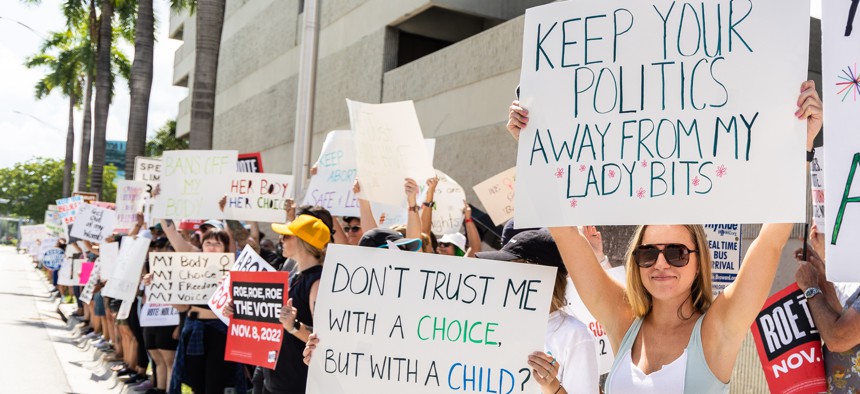FAQ: The future of abortion in Florida
Plenty of political and policy questions have arisen in the wake of Roe v. Wade being overturned.

An abortion rights activist holds a sign at a protest in support of abortion access on July 13, 2022 in Fort Lauderdale. Photo by John Parra/Getty Images for MoveOn
Despite Republican leaders’ efforts to restrict access to abortion in the Sunshine State, Florida now is considered a “haven” state for the procedure in the South. Lawmakers passed and Gov. Ron DeSantis signed into law earlier this year a measure that outlaws abortions after 15 weeks of pregnancy, shortening the window from the previous 24 weeks.
Since then, the U.S. Supreme Court overturned the landmark Roe v. Wade case, essentially ending the federal right to an abortion. Now, “red states in the Deep South have been one-by-one criminalizing nearly all abortions,” Pew Stateline recently reported, leaving Florida and North Carolina as “abortion oases” – at least until after this year’s general elections in November. So far this year, state records show there have been 37,743 abortions performed in Florida, compared to 79,817 for all of last year. Those numbers include out-of-state residents who came to Florida.
DeSantis hasn’t hinted where he’ll next go on abortion, assuming he wins reelection this year. His spokesperson issued a statement saying only that the state will continue to defend the 15-week ban and adding that “the fight to protect life is far from over.” It’s as good a time as any to ask where the state of abortion access is now in Florida – and where it may be going.
What exactly is current Florida law on abortion? What’s allowed and what’s not allowed?
This session, lawmakers moved a bill (HB 5) that “prohibits abortions if the physician performing abortion determines the … age of the fetus is more than 15 weeks, based on the first day of the woman’s last menstrual period. This replaces the current prohibition against abortions during the third trimester,” according to a legislative staff analysis. The new law “retains the current maternal medical exceptions to prohibited abortions,” such as “to save the pregnant woman’s life,” and adds an exception for “fetal abnormalities” that lead to death.
The new law makes no exceptions for rape, incest, human trafficking or mental health, conditions that legislative Democrats unsuccessfully tried to amend onto the bill. Doctors who violate the ban by performing an abortion later than 15 weeks could be charged with a third-degree felony, punishable by up to five years in prison and a $5,000 fine. Republican state Sen. Kelli Stargel of Lakeland, one of the bill sponsors, told her colleagues on the Senate floor she “never dreamed I'd be here today,” referring to the bill passing, “actually being able to save the lives of babies.”
Now that Roe v. Wade is no longer the law of the land, why hasn’t Gov. DeSantis discussed what he plans next in Florida?
The governor tweeted on June 24, “The prayers of millions have been answered. For nearly fifty years, the U.S. Supreme Court has prohibited virtually any meaningful pro-life protection, but this was not grounded in the text, history or structure of the Constitution. By properly interpreting the Constitution, the Dobbs majority has restored the people's role in our republic and a sense of hope that every life counts.” (The 6-3 decision in which Roe v. Wade was tossed out, returning abortion regulation to the states, was called Dobbs v. Jackson Women’s Health Organization.)
DeSantis added: “Florida will continue to defend its recently-enacted pro-life reforms against state court challenges, will work to expand pro-life protections, and will stand for life by promoting adoption, foster care and child welfare.” He hasn’t significantly expanded on those comments since. “The problem for the governor is that we are very divided as a state on this issue,” said Charles Zelden, a professor of history and political science at Nova Southeastern University in Broward County. “So if he were to take a position that, say, we are going to end all abortions … that could bring about a reaction electorally.”
Abortion is “one of those issues that could bring about an unknown amount of swing,” Zelden told City & State. “It can motivate people to turn out to vote who wouldn't have voted. It could motivate people to change their votes. You don't know how much of an impact it would have, so why risk it? That’s what it comes down to.”
What other legal protections are there for abortion in Florida?
The state constitution, like the U.S. Constitution, grants no specific right to an abortion. Such a right is implied, however, in the privacy amendment adopted by Florida voters in 1980. “Every natural person has the right to be let alone and free from governmental intrusion into the person’s private life except as otherwise provided herein,” it says. “This section shall not be construed to limit the public’s right of access to public records and meetings as provided by law.”
In 1989, the Florida Supreme Court used that provision to strike down a law requiring a parent to consent before a minor child could get an abortion. In the majority opinion to In re T.W., the late Justice Leander Shaw Jr. wrote, “Florida’s privacy provision is clearly implicated in a woman’s decision of whether or not to continue her pregnancy. We can conceive of few more personal or private decisions concerning one’s body that one can make in the course of a lifetime … (than) how one's body is to become the vehicle for another human being's creation.”
Could that interpretation be overturned here as Roe v. Wade was by the U.S. Supreme Court?
Legal experts say that’s entirely possible, especially with a state Supreme Court that has three of its seven justices appointed by DeSantis. And the governor gets a fourth pick soon: He must soon select a replacement for Justice Alan Lawson, who’s set to retire effective Aug. 31. The court could get a challenge to the 15-week ban, now before the 1st District Court of Appeal after a Tallahassee judge ruled it unconstitutional. Abortion clinics and a doctor challenging the ban sued June 1, arguing that the 15-week limit violated the privacy provision. Circuit Judge John Cooper issued a temporary court order suspending enforcement of the ban, saying it violated the privacy amendment. The appeals court already has clawed back that order, suggesting it will rule against Cooper.
Danaya Wright, a constitutional law professor at the University of Florida’s Levin College of Law, said courts have long had to read a right to privacy into constitutions and then abortion rights into that, as well as rights to contraception and same-sex marriage. “As a jurisprudential move, it was unusual and I think that made it vulnerable to attack,” she said. Indeed, as to the federal constitution, U.S. Supreme Court Justice Clarence Thomas has said “privacy is an illegitimate constitutional doctrine and we should strike it,” Wright added.
“People might not have liked the extension of privacy to cover reproductive rights, but (courts) were clear that it all came down to this creation of privacy as a fundamental right in the federal Constitution, and then the Florida Supreme Court affirmed that the Florida privacy provision in its constitution includes the right to an abortion,” Wright told City & State.
Should the current case get to the state’s highest court, one option the justices could take is what Wright calls the “surgical drone strike,” somehow taking abortion out from under privacy, but leaving the right to privacy intact. That would require turning their backs on their own precedent in the T.W. case. “What's going to happen in Florida is going to be essentially, I think, a repeat of what's been going on at the federal level,” she said. “I could see the state Supreme Court allowing regulations that would really hamper women's rights to an abortion in Florida, but I don't see them getting rid of it altogether or, more precisely, being able to get rid of it altogether.”
Are any state lawmakers already planning to do something, either to further restrict abortion access or protect it?
State Rep. Webster Barnaby, a Deltona Republican, has already promised a bill banning abortion outright, according to news reports. Barnaby filed what’s known as a “fetal heartbeat” bill last legislative session, that “would ban abortion in Florida when a fetal heartbeat is detected, which usually occurs six to eight weeks after conception,” often when a woman does not even know she’s pregnant, the Tallahassee Democrat explained. That bill did not move forward. As House Speaker Chris Sprowls later told reporters, “Our laws have to be strong enough to jump through multiple levels of judicial scrutiny.”
But state Sen. Jason Pizzo, a Miami-Dade Democrat, says he has a solution that should please both sides of the aisle: Put the abortion question on the ballot. That is, he argues for lawmakers to pass a state constitutional amendment that would create a right to abortion. As with any amendment, voters still have the final say, requiring 60% to become part of the constitution. Pizzo envisions two parts: One would address the timing of any termination of a pregnancy, or how many weeks, and the second would cover exceptions, such as rape and incest.
Of course, lawmakers still will have to fight out the language of such an amendment, including whether to keep the current prohibition at 15 weeks. “I know there are a number of my Republican colleagues who do not want to go more restrictive (than HB 5) as it relates to women's reproductive rights. So this allows them to sort of punt and pivot to this,” he told City & State. “And everybody gets to say, ‘We let the people decide.’ ”
The News Service of Florida contributed background to this report.
